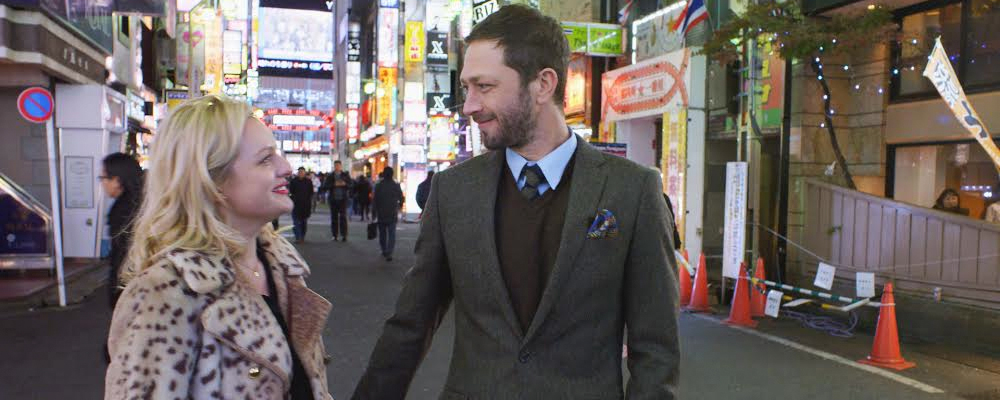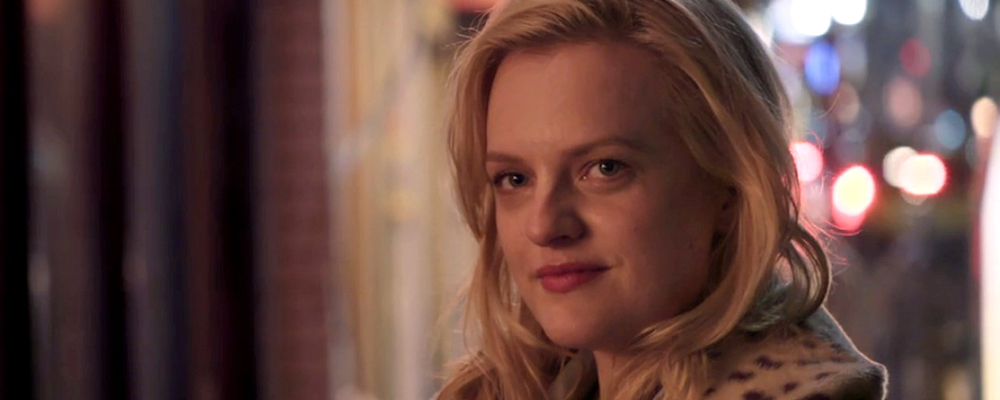Ebon Moss-Bachrach and Director Richard Shepard Talk ‘Tokyo Project’
Sandra Miska
With “Girls” having wrapped earlier this year, four of the key people behind the series – frequent director Richard Shepard, actor Ebon Moss-Bachrach and producers Lena Dunham and Jenni Konner – have already reunited for “Tokyo Project,” a romantic short film set to air on HBO that explores grief, human connection, and that wanderlust feeling one gets while traveling.
Ebon Moss-Bachrach previously has a recurring role in “Girls” as musician Desi, Marnie’s (Allison Williams) partner on stage and in bed. In “Tokyo Project,” he plays a much more likable character, Sebastian, an American man who comes to Tokyo on business. Quite appropriately for the “Girls” alum, he is promoting a brand of men’s Brooklyn-inspired grooming products, trying to sell that specific hipster look to the guys of Japan.
Bit and pieces are revealed about Sebastian’s life in the States, but we learn early on that he has an estranged wife and has experienced an unspeakable tragedy, the circumstances of which the viewer may miss it they don’t pay close attention. Through Sebastian, the viewer is treated to an intimate tour of one of the most populated cities in the world, as he travels to bars, restaurants and small shops, taking in the sights tastes and sounds. After a few wordless encounters, he connects with Claire (Elisabeth Moss), another American who seems as eager as he is to forget about whatever troubles she left back home and live in the moment. The pair enjoy a romance that ends in a surprise twist.
“Jealousy inspired me to write the film,” writer/director Richard Shepard admitted to “Entertainment Voice.” “‘Girls’ was shooting an episode in Tokyo, and I went with the production, but I wasn’t directing that episode. The entire time I was there I was so jealous that I wasn’t directing the episode, because Tokyo was so incredible and cinematic that I took my jealous anger and funneled it into creative scriptwriting. Weirdly the inspiration came from that, but I had been wanting to tell a love story and I wanted to be telling something slightly different than the normal stuff that I do – A little bit more ethereal, a little more emotional.”
For Moss-Bachrach, there was no reason to say no when his buddy Shepard approached him about starring in “Tokyo Project.”. “It checked off all of my boxes – Amazing locations, director who was also a dear friend of mine, great script, and Elisabeth Moss was an actress that I’ve always really admired. I felt like the luckiest guy in the world.”
When one thinks of romantic cities, Tokyo may not be one of the first that comes to mind, but “Tokyo Project” aims to change that. Both Shepard and Moss-Bachrach found themselves seduced by the city.
“Tokyo was very inspiring, both emotionally and visually,” recalled Shepard, a New York native who admits to feeling at home in a big city. “It really does feel foreign to many people, but I love the energy of the city where you can be around thousands of people on the street and then turn a corner and find a sake bar that is completely empty. It’s this world where you can find moments of peace and quiet, as well as moments of chaos.”
“The process of getting to know a place, if it’s an amazing place, a lot is very romantic,” said Moss-Bachrach. Like Sebastian, he enjoyed the sensory delights of his new surroundings, such as exploring shops and tasting new foods and drinks. “It’s very visceral It’s so hard to walk around and work there, because I just wanted to explore everything. …The little alleyways, they storefronts you go down and you have no idea what’s behind the door. We shot a scene in a movie poster store, and I didn’t realize that the art for movies changes quite a bit from country to country, from territory to territory. I looked up all these movies that I loved, and I see all these sort of interesting takes on what they chose to be the poster…”
In order to get in character to play Sebastian, Moss-Bachrach didn’t have to go to too dark a place, as wallowing in sadness is something that the character avoids for the most part as he strives to keep occupied. The actor explained, “In terms of the grief, I think, like many people who are grieving, he’s trying to not think about death. I think he’s trying to take his mind off of that.”
Shepard went on to explain how foreign surroundings play a role in Sebastian and Claire’s journey. “There is a slight alienation [that comes from] being jetlagged in a city you don’t speak the same language in, and I thought that would work well in this story about these people who are going through some sadness in their lives and find this connection between each other. …Foreign travel in a way brings out a different person in us. When you’re traveling, everything is more romantic, weirdly. You go to a restaurant when you’re traveling and it’s the greatest experience ever.”
It’s no coincidence that Sebastian ends up at movie poster store with local pals at one point, as this cinephile side of the character was inspired by Shepard’s own love of film. “I wanted to get my love of Japanese cinema in there. That movie poster shop where they find the old movie posters, that’s a movie poster shop that I loved and wrote into the movie. There’s definitely a part of me there, but I feel like writers bring parts of themselves, whether real or imagined into everything that they create.”
Moss-Bachrach and Moss have electrifying chemistry together as Sebastian and Claire shed whatever problems they had and enjoy an enchanting evening together, being playful and affectionate with each other. Although we know that Sebastian has a wife, it’s not as clear what Claire’s secret is, and for a brief moment, no one cares. “It was kind of fun,” Moss-Bachrach said of these scenes. “It was kind of like play acting, or role playing. It seemed like a kind of game that they were playing where they were making up the rules as we went along, so it felt exciting to me.”
As “Tokyo Project” has an open ending, one cannot help but wonder what happens to these lovers after the credits role. “I try to go with a happy ending,” said Moss-Bachrach. “The movie ends with a chance of of some kind of future for them. I think he really needs her.”
Although Moss-Bachrach and Shepard previously collaborated on multiple episodes of “Girls,” the actor revealed how making “Tokyo Project” was an entirely different experience. “For example, Richard has directed me in a lot of love scenes in ‘Girls,’ and it’s always like, ‘Ebon, put your mouth on her breast,’ from over a walkie talkie and Richard’s, like, a million miles away somewhere in a tent surrounded by people looking at a video. In this, when he was like, ‘Ebon, put your mouth on her breast,’ he was sitting next to me in the bed. [I saw] Richard a lot more. He was right there. I don’t think he ever operated the camera, but he was right there. It was a freer, more spontaneous shooting experience.”
Shepard wholeheartedly agreed with Moss-Bachrach about ‘Tokyo Project” being a more intimate experience than shooting an episode of “Girls,” which often had a crew of 80, compared to the band of 12 that they took with them to Tokyo. “We didn’t even have permits. We just walked around with them throughout Tokyo,” he confessed. “I think from an acting and directing standpoint, that intimacy allowed to really explore stuff and really be open and sort of enjoy the experience in a different way. I think that both Lizzie and Ebon are very experienced actors and both do amazing things, but one of the things I think they were excited about, and one of the reasons they agreed to do a short film, which is sort of an odd things to agree to do, was that they were both looking for a different sort of experience.”
Also making the filming a more relaxed experience was the fact that it was truly a passion project, as Shepard and the cast and crew did not know if and how it would ever be distributed. “We knew for sure that it was not doing to air anywhere,” said Moss-Bachrach with a laugh. “I assume if I’m working on a short film, or I assume if I’m working on any movie, who knows if anybody will see it, and try and make the process of making it be my experience.”
“Tokyo Project” allowed Moss-Bachrach to show a different side of himself that fans of “Girls” will surely find refreshing after watching him play the narcissistic, often erratic musician Desi. As unbearable as Desi became for Marnie and those around him, Moss-Bachrach revealed that he very much enjoyed playing the character and finding his humanity. “I loved playing Desi. He’s unlikable at times. He’s childish and selfish. It was a very fun, emotional kind of character to play. He was kind of like a baby in some ways, but also found him to be like a real [person], like genuinely searching for something, trying and failing and trying and failing. Those kinds of characters, actors like to play those. When they are fighting for a cause, you have a lot of room to play.”
Not surprisingly, it was Shephard’s intention to bring out a different side of Moss-Bachrach, who wrote the role specifically for his friend. “I had worked with Ebon on ‘Girls,’ and I wanted to show a different side of his personality, which I knew was there, a more hopeful side, so I wrote it for him and it was really easy in a way to write it, because I knew this other side of Ebon that I wanted to show.”
Not only did “Girls” bring Shepard together with Moss-Bachrach and executive producers Dunham and Konner, as well as serve as inspiration for his short in a way, it also gave him the financial boost he needed to bring to life “Tokyo Project.” “Short films are sort of difficult to get financed, so I was figuring out how I was going to be this movie even made and I got a residual check from ‘Girls,’ so that’s how it came full circle… I was like, ‘You know what, this is a sign that I should make this movie,’ and I was lucky enough to be able to do it and to have this truly creative experience.”
Speaking of “Girls” and love scenes, Moss-Bachrach did his fair share of raunchy ones with Williams, including one particularly memorable one that took place in a kitchen in the premiere episode of the fourth season. Did Moss-Bachrach have any idea when filming the simulated sex act that it would cause such ripples? “I knew we made a pretty funny scene when we did that, but I didn’t think it was going to [be such a big deal]. Wasn’t it at the Emmys or the Golden Globes where Andy Samberg made a joke? I didn’t think that it was going to become trending or whatever for 48 hours. I’ve given up on trying to predict that stuff. Yeah, it was funny, fun. I was proud of that scene.”
Shepard spoke about his creative bond with Dunham, whom he was friends with before “Girls” and became closer with while making the series. “Just to be around her creative energy is extremely intoxicating and palpable as artist,” he gushed. Shepard credits Dunham and her producing partner Konner with connecting him to Moss.
Shepard went on to discuss what it is like working with Dunham and how “Tokyo Project was different. “Lena Dunham is a very strong boss to work for. She’s very opinionated and very smart, the smartest person in the room. She gives you a lot of latitude and she wants you creative input, and she embraces your creative input, but ultimately, the buck stops with her. And one of the things that was nice about the short, ultimately, was that the buck stops with me. That’s good to have that so I can try stuff that may or may not work, but it’s ultimately my decision… Working with Lena as an example is a very freeing experience because she gives you latitude, but at the same time, you’re ultimately giving her the show she wants. So, I think the combination of doing different things in which some I have full creative control and in which some I don’t, helps with both. It’s really nice to be working on a show like ‘Girls,’ because you know Lena’s watching out and making sure you’re not screwing up. I value that as much as I value having no one telling me not to screw up.”
Does Shepard have a favorite episode of “Girls” that he helmed? “I guess my favorite one, and I have a lot, I guess this past season’s episode ‘American Bitch’ with Matthew Rhys. It really struck a nerve with people. I guess my favorite that I did was ‘One Man’s Trash,’ which was the Patrick Wilson episode from the second season. I think that sort of set a definition of what type of different shows we could do on ‘Girls.’ It was such an incredible experience and I was so proud of the acting and script and filmmaking in that. It’s hard to pick a favorite, but those two definitely, I think in terms of that way we made them and in terms of the way they affected popular culture.”
Next up, Moss-Bachrach can be seen in the upcoming Netflix series “The Punisher,” which is based on the popular Marvel comics character. “I’m a NSA agent who’s in hiding. That’s pretty different from ‘Girls.’ Pretty different from ‘Tokyo Project.’ It’s not very funny.”
“Tokyo Project” premieres Oct. 14 on HBO.






